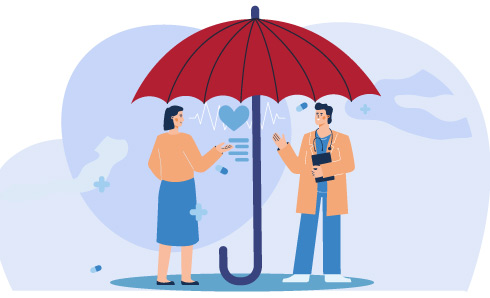Health Insurance
Get a free health insurance quote

It’s no secret that healthcare costs in the US are sky-high when compared to other countries.
Last 2015, Statista released data showing the US having the highest hospital costs per day among those listed, averaging at USD 5,220, while Switzerland came second at USD 4,781.
More recent data (2021) by Debt.org suggests that this number has gone down to an average of about USD 2,607 for the entire United States, and is at USD 2,810 in Illinois. However, staying overnight jumps the figure astronomically, coming in at about USD 11,700 – although various insurance safety nets pay for most of it.
And that’s not all – the Covid 19 pandemic has had a wide and varied effect on the country’s healthcare system and has created an economic catastrophe besides.
Suffice to say – we’re not in normal times. If you’re like the average American, it almost seems like getting sick and hospitalized might well put your entire family into a financial crisis, what with all the world events seeming to happen simultaneously.
During these times, having health insurance is all the more critical.
What is Health Insurance?
Health insurance or Medical insurance is the safety net that will cover some of the costs to help you put your physical health back together.

If you get sick or injured and consequently need hospitalization, medicine, or other forms of healthcare, this insurance program will kick in, and it will provide coverage to your overall hospital bill. It’s incredibly important to have health insurance for all US families.
As we’ve established, healthcare can be pretty costly in the US. This means that without medical insurance, you will be left with massive debt from healthcare costs.
And that’s if they even decide to treat you.
In the US, only the screening and stabilization processes are free in hospitals if you’re uninsured. This means that, technically, the only duty of medical care providers is to make sure that you don’t immediately die.
Other than that, they will have to make a formal decision whether or not they will proceed to treat you even without insurance.
You can’t also just get medical insurance when you’re already at the hospital doors.
For one, you can’t be insured for pre existing diseases.
Two, even if you don’t have a pre existing disease, some types of insurance have set enrollment periods. Medicare, for instance, only allows enrollees from November 1 to January 15. This period is known as Open Enrollment. If you haven’t made it through that, you can’t get it outside of a very specific set of circumstances (also called QLE or Qualifying Life Event).
Types of Health Insurance
Now that you understand what health insurance is and how important it is for your overall finances and physical health, you might already want to shop around for the best one you can find.

Before you can do that, though, you need to understand the types of health insurance available to you. Let’s go over each main type briefly.
The ACA was signed by former President Barack Obama in 2010. This law expanded an existing government program called Medicaid, making it more accessible to low-income people.
This law also required the establishment of the Health Insurance Marketplace, also called the ACA Marketplace.
There, people can shop around for health insurance coverage, using government-established baseline health benefits that an individual needs to get.
Short-term health insurance is ideal for those who are facing specific situations, such as individuals who are currently in between jobs or are unemployed and young adults who are no longer covered by parents.
This health insurance program is financially supported by both the state and federal levels of government.
This government health insurance package was originally designed for those aged 65 or older. However, it has grown to include physically or mentally disabled individuals (even under 65) and individuals with special circumstances.
This program has four parts: A, B, C, and D. These parts designate the level of coverage that you can get from medicare.
This government program is separate from Medicare, although you will often hear the words together because they’re both funded by the government.
However, Medicaid is a nationwide program designed for those who would have found traditional health insurance challenging to attain, such as low-income families, seniors, and those with physical or mental disabilities. You need to meet an income qualification if you want to get Medicaid.
This government health insurance plan incorporates elements from both Medicare and Medicaid. Although you typically can’t have both, the D-SNP plans are designed for those eligible for the special requirements that both Medicaid and Medicare impose.
If you’re a full-time employee, chances are you’re covered by medical insurance from your employer. In these instances, the coverage and requirements that you get will depend on your company’s insurance provider.
Oftentimes, self-employed individuals are forced to search for the right insurance policies themselves. Luckily, Magnum Insurance offers numerous options to choose from.
There’s a wide variety of workplace benefits available in the market. Most of the time, your policy can only change if you meet certain requirements at work, such as seniority or a promotion.
If you can’t get your health insurance from a government program or an employer, you might need to opt for third-party insurance providers.
Insurance providers can vary widely in cost and quality, so you need to choose carefully. If you want affordable and reliable insurance tailor-fitted just for you, Magnum Insurance is right here for you.
Who Needs Health Insurance?
It’s highly recommended that everyone gets health insurance. We’re living in uncertain times, health-wise and in everything else. With monumental changes going on, getting hospitalized might just be what will plunge you and your family into financial catastrophe.
Getting a health insurance package gives you a healthy measure of security and peace of mind for your day-to-day life.
When you, and your family members, are ensured, you know that you will at least have something to fall back into in case something happens. Plus, most medical insurance packages also include preventive care, accidents, vaccinations, screenings, options to add dependents and more.
This means that subscribing to a health insurance subscription, wherever you can get it, will do far more for your health than not doing anything.
How Much Is Health Insurance?
If you’re paying for everything, the health insurance cost does mount up over time. However, you do get a certain measure of safety and security from the knowledge that you, or your family, won’t be too financially burdened in the event of a medical emergency.
Before you buy medical insurance, you need to know how much the premiums are.
As of this year, the average monthly cost of insurance in the US is $541, while the average annual deductible falls to $5,940.
Of course, prices can vary vastly depending on which state you live in. For example, West Virginia boasts a particularly high premium at $831, while in Maryland it’s only $344.
But health insurance premiums are more than just averages. In fact, there are multiple factors at play.
- Age. Your monthly premium can change depending on how old you are. The older you get, the more prone you can be to illnesses or diseases, so the risk is higher.
- Location. As mentioned, where you live plays a key role in the price of insurance premiums that you’ll likely pay. This is because of the local averages, which are in turn driven by specific local factors like crime rates, disaster-prone areas, and more.
- Coverage. The monthly premium will change depending on how many people are covered. The more the number of individuals covered, the greater the risk for the provider, so you can expect more in insurance premiums.
- Medical history. History of diseases in the family, as well as lifestyle choices like tobacco use, alcoholism, and other factors, can influence your insurance prices. This is because your medical history will reveal just how risky your coverage will be to insurance providers.
- Type of coverage. As you might have already seen, there are multiple types of coverages and multiple health plans, which will also affect your premiums.
Requirements for Affordable Health Insurance
By far the most affordable health insurance can be found in the ACA Marketplace. However, there’s a list of eligibility requirements that you have to pass before you can apply or re-enroll to it.
This includes things like:
- Personal and family information
- Legal documents like SSNs, immigration documents, taxes, etc.
- Household employer and income information
- Current health coverages, etc.
Getting Health Insurance with Magnum Insurance
Health insurance is one of the most critical financial safety nets that you should have at all times. If you don’t have health insurance yet, then you’re at serious risk. No matter how healthy or safe you think your life is when something happens, you need to be ready.
When choosing the best health insurance, make sure you get what’s best for your needs.
If you want the best health insurance that your money can buy, reach out to Magnum Insurance for a free health insurance quote. We provide high-quality medical coverages that maximize every dollar you spend on it.
Related Links
Locations we serve
Magnum Insurance makes Health Insurance easy
Get a free Health Insurance quote today
Is there a local Health Insurance agent near me?
Try our Location Finder to find the nearest agent near you.







